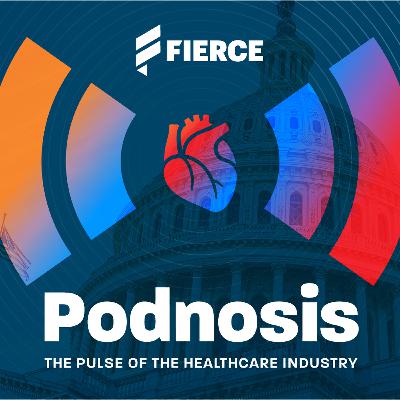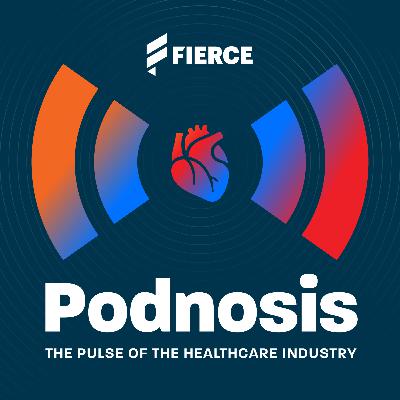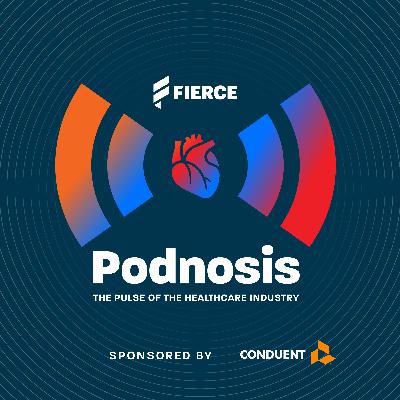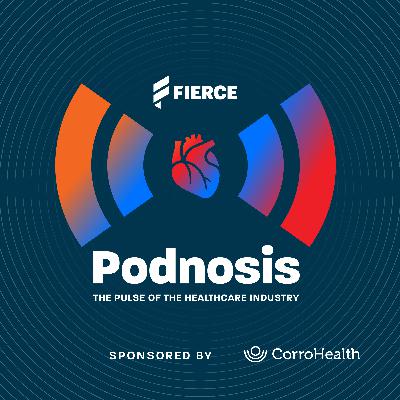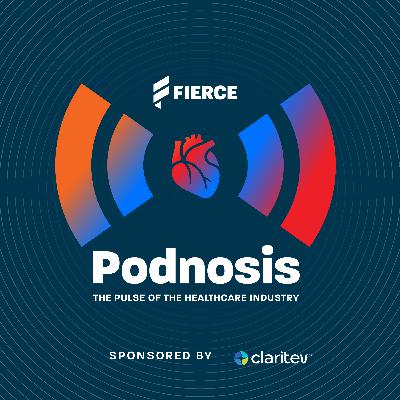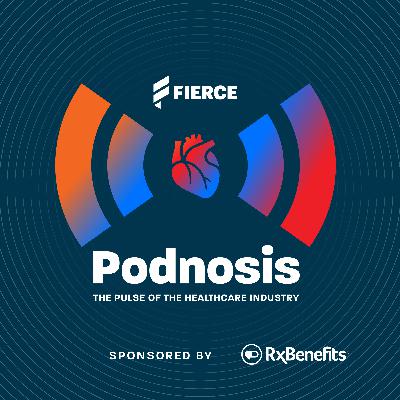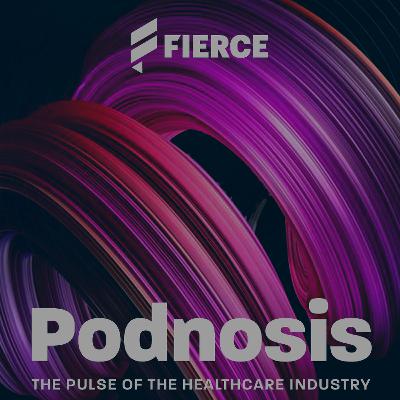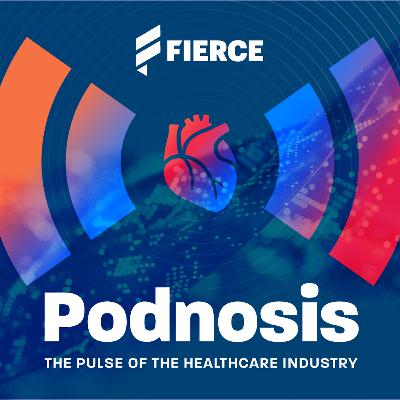Discover Podnosis
Podnosis

Podnosis
Author: Fierce Healthcare
Subscribed: 24Played: 745Subscribe
Share
Description
Podnosis: the pulse of the healthcare industry. Every week, journalists from Fierce Healthcare dive into some of the industry’s biggest trends. We talk to the experts about what’s important now so you can prep for the future. Hear about all things healthcare, from physician practices to hospital chains and insurance giants—and those that mix all three—plus the tech they use, disruptors looking to compete and people moving the sector forward. Follow Podnosis on Apple Podcasts, Spotify, Amazon or wherever you get your podcasts.
175 Episodes
Reverse
Since the Trump administration took office in January, healthcare policy has been moving quickly, with changes touching Medicaid funding, ACA subsidies, hospital finances and the federal government’s approach to health technology. This week on "Podnosis," we’re bringing you a recording from a live roundtable at the Fierce Health Payer Summit on Dec. 4, where members of the Fierce Healthcare editorial team unpacked the policy and funding shifts already underway. The discussion covers Medicaid cuts and coverage losses, how hospitals are preparing for reduced government funding, CMS’ new health tech ecosystem and where PBM reform stands after years of scrutiny. To learn more about the topics in this episode: Crapo, Cassidy introduce ACA subsidy plan that leans on HSAs AHIP presses for ACA subsidy extension, further program integrity measures Medicaid work rules exempt the 'medically frail.' Deciding who qualifies is tricky When the hospital leaves town Many urban safety-net hospitals threatened by OBBBA's Medicaid cuts: analysis Industry Voices—3 major changes to Medicare Part B payment policies coming for 2026 'Come fight with me'—Oz courts physicians skeptical of Medicaid cuts, MAHA's criticisms KFF: States brace for increasing Medicaid costs even as enrollment stays flat All 50 states submit applications for $50B Rural Health Transformation Program The policies top of mind for healthcare stakeholders right now Hospital M&A continues to rebound as policy uncertainty clears See omnystudio.com/listener for privacy information.
Each year, Fierce Healthcare’s Women of Influence special report asks a simple question: Who is actually reshaping healthcare from the inside? This year brought a record number of nominations and a list that reflects how broad that influence has become, across health systems, payers, tech, policy and advocacy. In this episode, Fierce Healthcare's Heather Landi and Paige Minemyer talk about why this recognition still matters, even as women make up nearly half of managerial and executive roles but remain scarce in CEO positions. They get into what the nomination surge tells us about where change is happening, how roles and titles are evolving and why so many of the most interesting ideas in healthcare are being led by women who are still fighting for a true share of power. To learn more about the topics in this episode: Fierce Healthcare's Women of Influence 2025See omnystudio.com/listener for privacy information.
It’s been a buzzy few years for prescription digital therapeutics, marked by bankruptcies, reimbursement policy changes and AI advancements. At their best, DTx solutions can offer a more personalized, convenient and cost-effective care experience. But barriers to adoption remain. What are they, and what’s being done about them? Senior Writer Anastassia Gliadkovskaya explores these questions with Joseph Perekupka, CEO of Freespira, and Andy Molnar, SVP of industry affairs for the American Telemedicine Association. To learn more about the topics in this episode: Access to Prescription Digital Therapeutics Act reintroduced in Congress How companies use scientifically informed music to impact health outcomes CMS puts forward meager offering for digital health in final Medicare physician fee schedule rule American Telemedicine Association's lobbying division acquires Digital Therapeutics Alliance See omnystudio.com/listener for privacy information.
Conduent is leaning into artificial intelligence to help clients navigate budget constraints, improve service quality and streamline operations, according to Mandy Huckaby, vice president and general manager of customer experience management. Speaking on Fierce Healthcare’s Podnosis podcast, Huckaby said the company is focused on helping clients “do more with less” by integrating AI across customer-facing and back-office functions. She emphasized that AI is not new to Conduent, which has used the technology for more than a decade. “AI is literally just having technology augment an interaction,” Huckaby said. “We’ve been doing technology augmentation with chat, digital landscaping and other services for a long time.” Conduent’s AI strategy targets three areas: pre-engagement automation to help customers self-serve, agent support tools to improve response speed and quality, and back-office enhancements such as document processing and legal text analysis. In healthcare, Huckaby said AI is being used to support nurses and HR representatives, among others. The company also partners with vendors like Microsoft to deliver sentiment analysis and quality audits. Huckaby said clients are increasingly looking for creative problem-solving and authentic customer advocacy. “It can’t just be reading off a script,” she said. “Our customers are looking for empathy and understanding.” As industries face rapid technological change, Huckaby said Conduent encourages its teams to remain agile and forward-thinking. “Change is inevitable,” she said. “It’s our ability to be flexible and agile through that change.”See omnystudio.com/listener for privacy information.
With the longest government shutdown in U.S. history as a backdrop, for-profit providers and payers detailed the continued regulatory uncertainty and pressures on their businesses in the third quarter. In this episode of "Podnosis," Editor Dave Muoio and Senior Writer Paige Minemyer break down the key trends for the third quarter, including how insurers shed light on strategic priorities, the impact of the ACA subsidy conversation and why providers saw a surprise revenue windfall. To learn more about the topics in this episode: Insurers slammed by medical costs, regulatory pressures yet again in Q3 Tax credit turmoil, cost pressures set stage for tumultuous ACA open enrollment Amid shutdown, health IT vendors say hospitals are cutting back on spending See omnystudio.com/listener for privacy information.
In a recent episode of Podnosis, Dr. Jerilyn Morrissey, chief medical officer at CorroHealth, called for a strategic overhaul in how hospitals approach clinical documentation and payer denials. “Documentation has become the battlefield where clinical, financial and payer priorities collide,” Morrissey said. Tracing the evolution of medical records from ancient Egypt to modern electronic systems, she emphasized that while technology has enabled better data sharing, it has also introduced administrative overload and clinician disengagement. Morrissey challenged the common belief that denials stem from provider error. “Denials are a payer strategy,” she said. “They distract and delay, and they’re designed to do just that.” She urged healthcare leaders to shift from reactive to proactive strategies, focusing on clear expectations around reimbursement. Hospitals spend nearly $20 billion annually fighting denials, often by adding more staff or vendors. Morrissey cautioned against this approach, noting that more resources rarely yield better outcomes. She also questioned the effectiveness of AI-generated appeal letters, citing a low success rate and rapidly changing payer policies. Instead, Morrissey advocated for integrating technology earlier in the care process. “Denials don’t start when we submit a claim,” she said. “They start at the point of documentation and decision-making.” Looking ahead, Morrissey sees promise in AI for clinical support, pattern recognition and denial prediction. But she warned that trust in technology must be earned. “AI works most of the time, but not all of the time,” she said. “We’re not yet at a point where we can remove the human from the loop.” Her advice to healthcare executives: embrace innovation with creativity and collaboration, and aim to be “constructively destructive” in reshaping the system.See omnystudio.com/listener for privacy information.
Florida is among the fastest-growing states in the U.S. Demand for healthcare is also growing. Predicting community needs can help organizations be better prepared to serve patients. To understand what health systems in Florida are thinking about when it comes to architecture and design, Senior Writer Anastassia Gliadkovskaya talks to Michael Compton, director of healthcare, Florida, at Barge Design Solutions. Compton shares the projects he takes on as a board-certified healthcare architect and predicts what the next few design trends might be in the state. To learn more about the topics in this episode: 'We can't do this alone': Hospitals share lessons from Hurricane Helene to prepare for extreme weather events Kaiser Permanente launches renewable energy microgrid at California hospital Florida health system tackles expansion challenges to meet growing demand See omnystudio.com/listener for privacy information.
The hype around artificial intelligence in healthcare has yet to fizzle out. The technology offers a significant opportunity for healthcare organizations to reduce complexity and inefficiencies in the system. However, there are plenty of risks to navigate, too. In this episode of "Podnosis," Senior Writer Paige Minemyer sits down with Sandeep Dadlani, CEO of Optum Insight and former chief technology officer at UnitedHealth Group, to discuss how the industry giant is deploying AI today and the guardrails that are necessarily in place to keep patient data safe. To learn more about the topics in this episode: UnitedHealth taps Sandeep Dadlani to lead Optum Insight unit AI Pulse: Microsoft rolls out updated 'Copilot for health' feature; athenahealth embeds agentic AI into athenaOne platform AMA launches initiative in bid for AI policy leadership Optum unveils new AI-powered claims processing platform See omnystudio.com/listener for privacy information.
In this sponsored episode of Podnosis, host Chris Hayden speaks with Dr. Jigar Patel, Chief Medical and Product Officer at Claritev, about one of healthcare’s biggest financial blind spots—revenue leakage. Dr. Patel explains why hospitals often lose up to 15–25 cents of every revenue dollar through inefficiencies, under-optimized contracts, and fragmented data systems. He shares how lack of analytics expertise and opaque reimbursement models especially impact community and rural hospitals, and how initiatives like price transparency are beginning to level the playing field. Dr. Patel also introduces Claritev’s CompleteVue, a solution that helps CFOs and revenue leaders identify leakage points, benchmark reimbursement rates, and strengthen contract negotiations. Tune in to learn how health systems can use data to improve reimbursement integrity, reduce administrative waste, and sustain financial health in an increasingly complex payer landscape.See omnystudio.com/listener for privacy information.
There is a newer wave of middlemen in the self-insured market: alternative funding programs. The for-profit vendors claim to help employers save money on expensive specialty medications by obtaining them for free or at a steep discount through alternative sources. While they may sound promising, some healthcare experts describe them as sneaky, harmful to patients and in a gray zone ethically and legally. Last week, Fierce Healthcare published an investigation into the business model and consequences of alternative funders. In this episode, Senior Writer Anastassia Gliadkovskaya describes her reporting process and findings with Executive Editor Heather Landi. To learn more about the topics in this episode: A new wave of middlemen offers 'alternative funding' for specialty drugs. Patients bear the risks As large employers back away from self-insurance, small- and medium-sized ones embrace it: EBRI Out-of-pocket spending on prescriptions grew even after accounting for rebates: studySee omnystudio.com/listener for privacy information.
Amid a breakneck pace of regulatory changes under the Trump administration, healthcare stakeholders are scrambling to keep up. Experts are sharing learnings and doing their best to understand how the policies of today affect the sector. Senior Writer Anastassia Gliadkovskaya chats with two executives with a front-row seat to those conversations: Maria Ghazal, CEO of the Healthcare Leadership Council; and Robert Andrews, CEO of the Health Transformation Alliance. Both organizations recently had meetings with their members to debrief on policies like President Donald Trump’s One Big Beautiful Bill Act, Most Favored Nation and more. To learn more about the topics in this episode: White House announces new prescription drug website, TrumpRx How the shutdown impacts healthcare: Reductions in force begin at HHS, with some hiccups at CDC New Medicaid federal work requirements mean less leeway for states Federal government enters shutdown, virtual care programs expire Note: Due to a recording glitch, Maria Ghazal's audio is slightly distorted early in the episode; it clears up shortly.See omnystudio.com/listener for privacy information.
Millions of Americans are affected by cancer each year. For many, hair loss is among the most distressing side effects of chemotherapy treatment, causing some to put off or refuse chemo. A revolutionary technology exists: scalp cooling, which involves wearing a cold cap during treatment to restrict blood vessels and reduce how much chemo reaches the hair follicles. Rossalynn Ripper, a breast cancer survivor, was able to use scalp cooling to prevent hair loss during her treatment. Now, she advocates for her home state of Maryland to pass a bill requiring insurers to cover the treatment. Senior Writer Anastassia Gliadkovskaya talks to Ripper and her oncologist, Young Lee, M.D., of Luminis Health, about why scalp cooling is important to treatment access and what barriers remain. To learn more about the topics in this episode: CMS rolls out new payment model on improving cancer treatments Accelerating solutions to cancer through impact investing More patients are surviving cancer, but incident rates rising among women and younger adults: ACS report See omnystudio.com/listener for privacy information.
Payment integrity is top of mind as insurers face growing pressure to eliminate fraud, waste and abuse. Successful programs require investment in technology and expertise to analyze trends and identify abnormalities. The team at Optum Insight works closely with insurers across the healthcare system to examine this data In this episode of "Podnosis," Fierce Healthcare senior writer Paige Minemyer sits down with Steve Yurjevich, CEO of the payer market at Optum Insight, to discuss the challenges and solutions in this space. To learn more about the topics in this episode: 'Well-intentioned, poorly executed waste': How tech companies aim to reduce billions in wasteful spending New Mountain Capital merges Apixio, Varis and The Rawlings Group in $3B deal CMS sets up real-time medical fraud center with DOGE; Federal contractor rolls out commercial tool Industry Voices—We need to fight fraud the right way See omnystudio.com/listener for privacy information.
The Democratic Women’s Caucus, a coalition of 96 lawmakers, advocates for women’s economic prosperity, healthcare access and safety. In this week’s episode of "Podnosis," Fierce Healthcare staff writer Emma Beavins speaks with Rep. Teresa Leger Fernández of New Mexico and Rep. Kelly Morrison of Minnesota about their policy agenda, including the impact of Medicaid cuts, the fight for abortion and birth control access, and efforts to work with Republicans on healthcare reform. To learn more about the topics in this episode: Fighting maternal and infant health inequities UnitedHealth report: Disparities persist in maternal, infant health Most states saw hospital obstetric service shutdowns from 2010-2022, with rural states hit hardest Gates Foundation invests $2.5B to spark women's health innovations The business case for investing in women’s health CMS selects states for Medicaid maternal health model Maternal mental health in the spotlight See omnystudio.com/listener for privacy information.
Lawmakers are turning up the heat on pharmacy benefit managers, with more than 1,500 bills introduced this year targeting drug costs, utilization rules and pharmacy networks. In the latest episode of Podnosis, Wes Hill, senior director at RxBenefits, said rising drug prices and pressure from constituents are driving the surge. While federal movement has been limited, states are advancing legislation at a rapid pace, creating new compliance challenges for PBMs and plan sponsors. Hill said employers—who shoulder much of the cost of pharmacy benefits—need to make their voices heard. By tracking legislation, assessing its impact and working with advisors, they can help shape reforms and protect their health plans. To hear more about the legal battles and what’s ahead for PBMs, listen to the full Podnosis episode.See omnystudio.com/listener for privacy information.
Medication nonadherence is not new, but it remains a persistent, complex problem. Adherence rates hover near 50%—roughly the same as two decades ago—as companies explore new ways to engage patients and help them stick to treatment regimens. Adhere Health combines technology with care navigators to identify at-risk patients and help them consistently access their prescriptions. In this episode of "Podnosis," Fierce Healthcare Senior Writer Anastassia Gliadkovskaya speaks with Chandra Y. Osborn, Ph.D., M.P.H., chief experience officer at AdhereHealth, about how the company takes on risk to drive outcomes and why it keeps a human in the loop. To learn more about the topics in this episode: Healthcare 'flying blind': Medication nonadherence and how remote therapeutic monitoring can help Out-of-pocket spending on prescriptions grew even after accounting for rebates: study PatchRx to integrate medication adherence data with virtual care platforms Scriptology acquires RxLive to build out its tech stack See omnystudio.com/listener for privacy information.
What are the main challenges hospitals face today? And how can they begin to get their arms around them while centering patients in their decision making? In this episode of "Podnosis," Senior Writer Anastassia Gliadkovskaya speaks to Janina Beilner, SVP of healthcare at Siemens, about how the company helps hospitals use technology in a thoughtful way to improve their infrastructure, operations and ultimately the patient experience. To learn more about the topics in this episode: How health systems are reshaping their strategies in the face of federal policy uncertainty Human-centered design in healthcare How Nvidia-backed Artisight is taking smart hospitals to the next level with AI and computer vision Breathing better: Hospitals begin to phase out major pollutants in patient care See omnystudio.com/listener for privacy information.
Hope, when applied with purpose and action, can be a powerful force for driving change in healthcare. That’s the philosophy of Eugene Woods, CEO of Advocate Health and a 2025 Fierce 50 honoree, who joins Ayla Ellison, Editor-in-Chief of Fierce Life Sciences & Healthcare, to share how he puts “Applied Hope” into practice. Woods explains how this approach combines optimism with action and why it’s become a guiding strategy for one of the nation’s largest nonprofit health systems. In their conversation, Woods discusses leading through massive organizational change, cultural transformation and the rapid adoption of new technologies. He offers insights on improving quality and affordability, investing in both rural communities and urban neighborhoods and preparing for a future shaped by AI and more human-centered healthcare delivery. To learn more about the topics in this episode: Fierce 50 of 2025 Eugene A. Woods—Fierce 50 Leadership Honoree See omnystudio.com/listener for privacy information.
Corporate venture capital is gaining traction across industries. From 2014 to 2024, it accounted for nearly half of all VC deal value. Healthcare is no exception: dozens of health systems now have venture arms or invest directly in healthcare startups. Arizona-based Banner Health is one of them, taking a strategic approach to equity deals and joint ventures. To unpack that strategy, Senior Writer Anastassia Gliadkovskaya spoke with Mark Garvin, former senior vice president of partnership and venture development at Banner Health. This episode was recorded before Garvin departed from Banner. He no longer represents the organization, but his insights remain highly relevant. To learn more about the topics in this episode: Banner Health boosts investment in AI-powered automation tech to maximize operating rooms What’s next for digital health investing in 2025? Ardent Health execs eye outpatient expansion, see nonprofits' headwinds as growth opportunity See omnystudio.com/listener for privacy information.
Transitions of care—moving patients from one care site to another—continue to be a major challenge in healthcare. Nearly 1 in 5 Medicare patients discharged from a hospital—approximately 2.6 million seniors—are readmitted within 30 days, at a cost of more than $26 billion every year, according to the Centers for Medicare & Medicaid Services. Salman Ali, CEO and co-founder of Kouper, saw opportunities to take a tech-based approach to care transitions, using generative AI to ensure patients don’t fall through the cracks after hospital discharge. As executive-in-residence at venture capital group General Catalyst, Stephen Klasko, M.D., has a front-row seat to the latest innovations in AI. And as former CEO of Jefferson Health in Philadelphia, Klasko understands the value of using technology to tackle operational pain points at health systems. In this episode of “Podnosis,” Ali and Klasko dig into Kouper’s approach to improving care transitions and why they see AI at a true inflection point. They talk about how hospitals can deploy AI without adding to staff burden and why trust matters more than technology in winning over health system leaders. To learn more about the topics in this episode: Kouper is tackling transitions of care armed with $10M from General Catalyst, 25Madison and CVS' venture arm Ohio attorney general approves sale of Summa Health to General Catalyst's HATCo, with some conditions Commure raises $200M in growth financing from General Catalyst See omnystudio.com/listener for privacy information.


